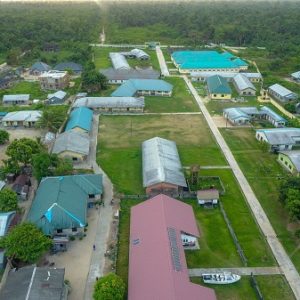Amidst the challenges of the pandemic year, PIND showed great flexibility in navigating the changed operating environment by holding a series of scenario planning sessions to creatively identify responsible ways to adapt our work for continued value delivery.
In a clear demonstration of the resilience of PIND’s program approaches and results, we collaborated with partners, and adapted our program plans, strategies, and approaches to take advantage of the opportunities and platforms presented by the pandemic to deliver on our mission to shrink poverty and conflict during the year of uncertainty and restrictions.
PIND began 2020
The pandemic's preventative measures significantly impacted our operating environment, annual plans, and how we planned to deliver our work. These measures included lockdowns, interstate border restrictions, bans on or the reduced size of public gatherings, the institution of social distancing rules, the use of PPE (personal protective equipment), and the enforcement of curfews. They limited economic activities that, in turn, led to job losses, while unemployment rose to 27 percent (from 23 percent in 2020).

The Economic Landscape
The national economic environment witnessed persistent rising inflation due to the devaluation of the NGN (Nigerian Naira). This was brought about by a sharp decline in oil prices, triggered by a fall in global demand due to the COVID-19 restrictions. Oil prices fell by 35 percent within the year, bringing about a 30 percent devaluation of the NGN and a rise in inflation from 11.4 percent in 2019 to 12.8 percent in 2020. The economy spiraled into a recession, and the bank lending interest rate hovered around 27 percent.
The rapid rise in the cost of electricity and fuel added to the economic crunch brought on by the onslaught of the pandemic. Modulating prices in accordance with market dynamics, the government increased petrol prices for three (3) straight months. The government also increased the electricity tariff, which translated into an over 70 percent tax increase for residential consumers receiving a minimum of 12 hours of power supply daily. This rapid rise hiked operating costs for businesses and negatively impacted their profitability. This also led to a hiked cost of living for households, inclusive of the cost of transportation, foodstuff, and other basic amenities.
The PIND-Supported Market Sectors
The devaluation of the NGN and rising inflation brought about by the COVID-19 disruptions hurt the agricultural sectors and market systems that PIND has been supporting over the last eight (8) years. The shocks from the pandemic also tested the resilience of the market systems.
Further, the COVID-19 restrictions disrupted economic activities. Farmers, particularly the urban-based, could not visit their farms for farming activities. Furthermore, the supply chains for necessary production inputs were hampered—such as feed, seeds, fertilizers, and crop protection products. This decreased market linkages and production outputs and portended a decline in profitability. The later-extended waivers by the government for the agricultural sector and access to pass for market actors gradually allowed the flow of inputs, products, and support services—albeit at high costs.
The aquaculture and poultry sectors witnessed an over 15 percent increase in the cost of inputs, while the crop sectors (cassava, palm oil, and cocoa) saw an over five (5) percent increase in the cost of inputs (improved seeds, herbicides, fertilizers, etc.).
Notably, whereas there were limited economic activities, government efforts were also increased to ensure minimal disruptions to the agricultural sector and farming activities. To reduce the impact of COVID-19 on the poor and to stimulate local production, the federal government introduced some economic stimulus packages and maintained the import-substitution drive geared towards food security. The federal government also rolled out additional initiatives and intervention funds for youth enterprise and artisan development. The use of technological innovations rose sharply as organizations and individuals adapted to the new world brought about by the pandemic.
Amidst this challenging backdrop, PIND showed tremendous flexibility in navigating the changed operating environment by holding a series of scenario-planning sessions to creatively identify responsible ways to adapt our work for continued value delivery.
Collaborating with partners, we adapted our program plans, strategies, and approaches. In a clear demonstration of the resilience of PIND’s programming, we took advantage of the opportunities presented by the pandemic to deliver on our mission during a year of uncertainty and restrictions.
Consistent with our reputation as a good steward, we delivered all our operations within the confines of a dynamic standard operating protocol (SOP) developed to ensure overall safety from the pandemic and its follow-on risks.
In this annual report, we showcase PIND’s program approaches in achieving sustainable development in the face of uncertainties, like the COVID-19 pandemic. We explore the adaptations, strategies, and approaches that we used; the resultant outcomes regarding poverty and conflict reduction; and our contributions to the sustainable development goals (SDGs).
According to the Peace Map (P4P-NigerDelta.org) data published in PIND’s Niger Delta Annual Conflict report, conflict risk and violence increased in the region while reported fatalities decreased.
Organized criminality (including kidnapping and piracy), gang violence (clashes between rival cult gangs), communal conflict (including land disputes and farmer/herder clashes), human rights violations (including sexual violence), mob violence, violent protests, and militancy/counterinsurgency largely commanded the conflict landscape of the region during the year.
Protests increased significantly, typified by the nationwide #EndSARS protests against police brutality that prevailed in all the nine (9) states of PIND’s operation that later snowballed into mass demonstrations, a crackdown by security forces, and the destruction of infrastructure in various locations by hoodlums who hijacked the protests. The ensuing arson, vandalism, looting, killing, and jailbreaks disrupted public peace and order, further disrupting work, and heightening the tense environment stirred by COVID-19.


